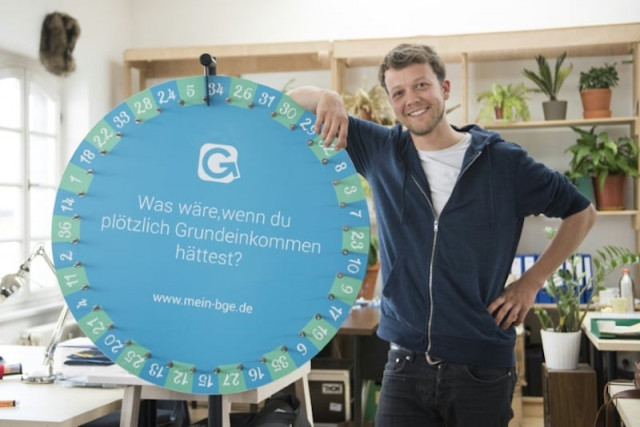Berlin startup offers a year with no money worries
The startup is out to prove the universal basic income (UBI) idea is workable

Michael Bohmeyer, founder of startup ‘Mein Grundeinkommen’ (My Basic Income) which raffles an unconditional basic income, poses for a photo at his office in Berlin on April 13, 2017. PHOTO: AFP
He is one of 85 people, including around 10 children, chosen by startup Mein Grundeinkommen (My Basic Income) to receive the payments for a year since 2014.
Founder Michael Bohmeyer has set out to prove to a sceptical public in Germany and further afield that the universal basic income (UBI) idea is workable.
"Thanks to my first startup, I got a regular income, my life became more creative and healthy. So I wanted to launch a social experiment," 31-year-old Bohmeyer told AFP.
And he wasn't alone in wanting to test the idea, as some 55,000 donors have stumped up the cash for the payments in a "crowdfunding" model -- with the final recipients picked out in a "wheel of fortune" event livestreamed online.
NED startup builds house in 3 hours for under Rs250,000
Mother Birgit Kaulfuss said little Miko "can't really understand, but for the whole family it was exhilarating" when he was chosen -- offering a chance to live "in a more relaxed way" and take a first-ever family holiday.
"Everyone sleeps more soundly and no one become a layabout," Bohmeyer said of his beneficiaries.
Recipients' experiences range from a welcome spell without financial worries to major turning points in their lives.
"Without day-to-day pressures, you can be more creative and try things out," Valerie Rupp told public broadcaster ARD in a recent interview.
She was able both to take care of her baby and start a career as a decorator -- even as her husband, newly arrived from Mali, was taking German lessons.
Winners have left jobs that were doing little more for them than put bread on the table to become teachers, taken time out to address chronic illness, broken alcohol addiction, taken care of loved ones, or paid for children's studies.
"It's at once a gift and a prompt" to make a change, explained Astrid Lobeyer, who used the money to give eulogies at funerals and studied the therapeutic Alexander technique, a method for relieving stress in the muscles.
Bohmeyer's experiment has fascinated social media and boosted discussion about a universal income in Germany.
Local startup ProCheck raises $250,000 in seed funding led by Sarmayacar
At the same time, Finland is testing the idea with 2,000 homeless recipients and the idea is a flagship policy for French Socialist presidential candidate Benoit Hamon.
In 2009, the German parliament flatly rejected a petition from some 50,000 Germans demanding a universal income.
Nevertheless, some 40 per cent of the public still think it's a good idea, according to a survey last June by pollsters Emnid.
Supporters have formed a campaign group called "Buendnis Grundeinkommen" (Basic income federation) with their sights on September's legislative elections, but so far no major party has taken up the cause.
There are pockets of support among left-wingers, the right, Catholic organisations and even industry leaders, whose reasoning ranges from fighting poverty to simplifying bureaucracy or smoothing the transition into the digital era.
Resistance to the idea is more focused, centering on how UBI would change people's relationship to work.
Right-wingers dismiss it as a "reward for laziness", while the Social Democratic Party (SPD) worried in 2006 about unemployed recipients being "labelled useless" rather than getting help to find jobs.
Meanwhile, major unions like IG Metall and Verdi denounce the idea as a "liberal Trojan horse" that would "boost inequality" by paying millionaires and poor people alike.
This Pakistani startup is competing for $1.5million prize money
Mein Grundeinkommen is "poorly thought out" as a response to broader social questions, University of Freiburg economist Alexander Spermann told AFP.
The startup's 20 employees eat up "60 per cent of the budget", founder Michael Bohmeyer admits -- while the idea of basing the funding on curiosity or activism by thousands of donors is hardly applicable on a large scale.
For Spermann, the Berliners' experiment has only succeeded in answering the question "what would I do with a blank cheque if I got one for Christmas?"
People's choices in terms of qualifications or work if they were guaranteed the payments for life are the real mystery, the economist argues.
"Who will take on the exhausting and sometimes less attractive tasks, like emptying bins or taking care of the elderly?" asked Werner Eichhorst of the Bonn Centre for the Future of Work (IZA) in 2013.
UBI supporters argue such jobs would either be taken over by robots or find a new place of honour in society if the policy were enacted.
"No machine will take over working for us and pay our taxes at the same time," Eichhorst and opponents shoot back.



















COMMENTS
Comments are moderated and generally will be posted if they are on-topic and not abusive.
For more information, please see our Comments FAQ